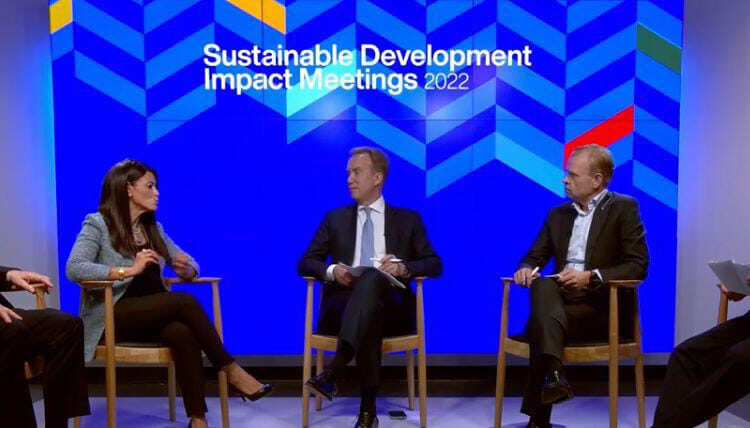The common goal is to move from pledges to implementation, and transform financial commitments made at COP26 into realistic action.
This statement by Minister of International Co-operation Rania el-Mashaat came during a World Economic Forum (WEF) panel discussion on the Geo-Economics of Climate Change as part of the 77th United Nations General Assembly (UNGA77) in New York.
President and CEO of Bezos Earth Fund, Dr. Andrew Steer, CEO of Yara International Svein Tore Holsether and Finland’s Minister for Development Ville Skinnari attended the discussion, which was moderated by WEF President Børge Brende.
The climate agenda had become a priority for the international community, in light of the challenges posed by climate change and its impact on development efforts, coupled with the aftermath of the Covid-19 crisis, the minister said.
Everyone is required to play an active role in addressing climate change, whether international finance institutions, governments, civil society, non-profit organisations and the private sector, the minister added.
The common goal, on a global level, is to move from climate pledges to implementation, transforming the financial commitments made at COP26 into realistic actions, el-Mashaat said.
“This is indeed the goal of Egypt’s COP27 presidency, as it works to galvanise the international community to fulfill commitments and encourage climate change adaptation efforts,” el-Mashaat added.
Multilateral development banks can also play a pivotal role in stimulating the private sector to participate in climate finance by expanding risk reduction tools and hybrid financing mechanisms, she said.
In less than 50 days, the COP27, as well as the G-20 Summit, will be held, thus presenting an opportunity to highlight the needs of the countries of the South, she added.
It also emphasises the importance of these countries in being at the centre of the international community’s attention to strengthen development efforts and to expand climate financing, the minister said, adding that Africa is one of the least emitters, and is yet most affected by climate change in the forms of water scarcity, desertification and food insecurity.
In order to support international efforts to finance climate change adaptation projects, the Egyptian Presidency of the COP27 is convening five regional forums in Asia, Africa and Europe, supporting countries in showcasing their pilot investment-friendly climate action projects and promoting regional integration in climate action and the green transformation.
The Minister spoke of a common denominator between climate and development, noting that any financing provided for climate action is essentially financing for development.
El-Mashat highlighted Egypt’s efforts to promote climate action and stimulate the transition from pledges to implementation through its COP27 Presidency. To that end, the Minister also discussed Egypt’s Country Platform for NWFE Program, the nexus of water, food and energy sectors. This brings together all development partners, with the private sector and the Glasgow Financial Alliance for Net Zero (GFANZ), to provide development financing, technical support, capacity-building and private sector investments for the program’s list of projects.
Recently, the Ministry of International Co-operation, in co-operation with the Ministries of Foreign Affairs, Finance and Environment, and the United Nations Economic Commission for Africa, organised the 2nd Egypt-International Co-operation Forum (Egypt-ICF), and the meeting of African Ministers of Economy, Finance and Environment, under the auspices and presence of President Abdel Fattah Sisi.
The forum witnessed the participation of 23 African governments, 20 discussion sessions, workshops and roundtables were held to prompt the international community to support Africa’s climate change agenda and to consolidate messages ahead of ‘Finance Day’ during COP27.






Discussion about this post